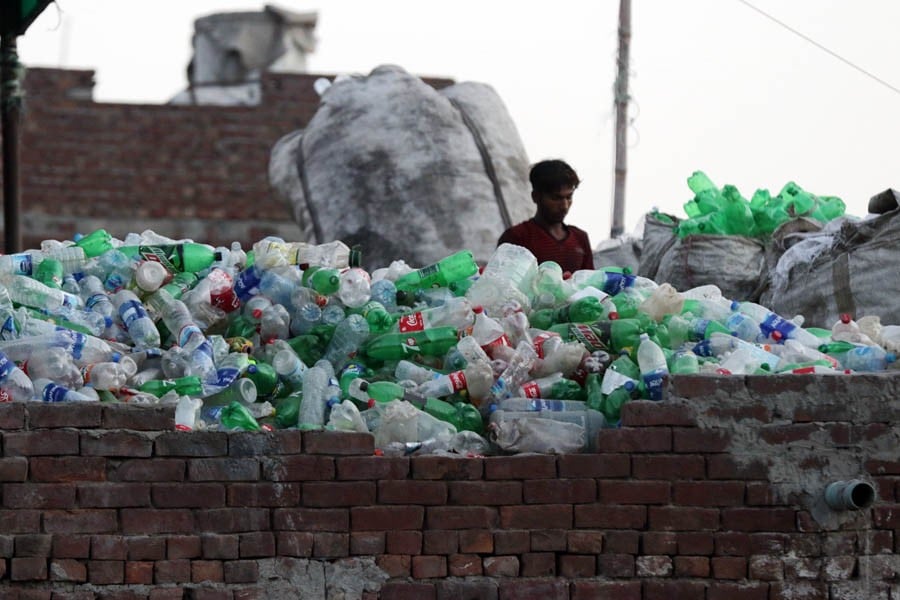
Uniform national policy is required for recycling plastic waste according to the modern trends and requirements

Recycling of plastic refers to the process of collecting plastic waste material and reprocessing it into brand new plastic products, instead of throwing the waste away which would, in turn, pollute land and water bodies.
There has been an abrupt rise in the overall production of plastic since the 1950s. According to National Geographic, the quantity of plastic being produced all over the world doubles every 15 years -- the fastest ever increase in the production of any man-made material. Hence, the reuse, recovery and the recycling of plastic is extremely important.
Normally six types of plastic are used but only three types -- Polyethylene terephthalate (PET), High-density polyethene (HDPE), and Plasticised Polyvinyl chloride (PVC) -- are considered feasible for recycling. Products that are made out of these plastic types include juice and soft drink bottles (PET), shampoo containers or milk bottles (HDPE), and juice or squeeze bottles (PVC). Lids and bottle tops cannot be recycled.
A typical plastic recycling process involves collecting, sorting, shredding, washing, melting, and pelletising. Processes may vary based on plastic resin or type of plastic product.
The plastic industry is one of the frontrunners in the business sector of Pakistan, clocking a growth rate in excess of 15 percent per year. According to the World Wide Fund for Nature-Pakistan (WWF-Pakistan), more than 8,000 recycling units are operational in various parts of the country. Waste management companies and scavengers are the prime sources of collection of plastic waste, however, there are some serious concerns over the collection and sorting methods.
Manager Environment Assessment and Green Office, WWF-Pakistan, Nazifa Butt thinks that waste management companies are doing their part but the problem arises when these companies hire partners to collect waste. "Recycling of plastic in Pakistan primarily depends on hundreds of thousands of scavengers or pickers who pick waste from garbage bags, on the curb or in the dumps," says Butt. "This is not an ideal model for waste management and is often unhygienic but is itself a result of lack of formal treatment and disposal facilities in the country," she says.
Several countries like the UK, Belgium, Canada, Germany and Saudi Arabia regularly export plastic scrap to Pakistan. According to various reports, plastic scrap imports jumped over a staggering 200 percent to 46,992 metric tonne in 2017 compared to 13,682 metric tonne in 2016. This is because many countries, including China, have totally banned such imports.
Experts and local industrialists express concern on the increased imports of plastic in Pakistan because such scrap might contain higher amounts of contamination residuals, pest dumps, germs and infections among many other harmful chemicals. Both Import Policy Order 2016 and the Basel Convention -- an international treaty designed to reduce movements of hazardous waste between nations in May 1992 -- have clear guidelines for the export/import of plastic scrap.
According to Import Policy Order 2016, Appendix-B, Part I, Entry 52 plastic scrap having PCT codes of 3915.1000, 3915.2000, 3915.3000, 3915.9000 are only permissible to industrial consumers after conducting extensive tests according to the Basel Convention. According to the convention, a plastic product that contains contaminants, fall in Hazard Classes 6 and 9 of the convention and should be sent back to the exporting country.
"If these plastic imports go unchecked the hazardous plastic scrap will cause very serious diseases to humans," says Shoaib Munshi -- vice chairman and spokesperson of Pakistan Plastics Manufacturers Association (PPMA). He believes that a complete ban must be imposed on the import of plastic scrap. Moreover, we must focus on improving the mechanism of collecting and recycling our plastic waste.
According to Nazifa Butt, plastic recycling in the world has become more advanced in recent years, nevertheless, the plastic produced by our local recycling entities contains high amounts of several hazardous elements and components. "Rampant violation of laws and regulations takes place within the recycling industry that needs to be addressed urgently by relevant authorities. Negligence in this regard puts not only the environment but also the lives of citizens at stake," she adds.
Recycling plastic provides a sustainable source of raw material to the manufacturing industry. However, experts believe that an efficient recycling industry working according to international health standards may also reduce our need for more fossil fuels, save energy, landfill space, and emissions of carbon dioxide and other greenhouse gases.